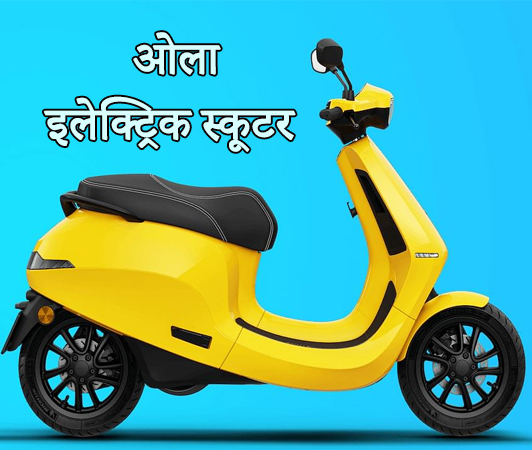At the stroke of midnight on 15 August 1947, India’s long night of colonial rule came to an end. Nearly 200 years under British dominion had passed, and now, as the world slept, India awoke to freedom. The air in Delhi was thick with emotion, relief, pride, sorrow, and hope intermingled. The first Prime Minister of independent India, Jawaharlal Nehru, stepped onto the balcony of the Red Fort to address the nation in a speech that would echo through the ages. His words captured the pain of the past, the responsibility of the present, and the promise of the future.
Table of Contents
Decoding what Nehru said: Freedom is a beginning, not an end
Nehru began by recalling the historic journey that had brought India to this moment. He spoke of a “tryst with destiny,” a solemn pledge made long ago that was now being redeemed. But he was clear that independence was not a conclusion but the start of a new and challenging chapter. The “stroke of the midnight hour” was a symbolic awakening; India’s soul was awakening to self-rule, but the real task lay ahead.
As we look back 78 years later, with a modern lens, the sentiment still resonates. In an era of rapid digital transformation, climate change, and global interconnectedness, the challenge is no longer just independence; it is to be relevant, adaptable and responsible.
Remembering sacrifice amid joy
The speech did not shy away from the cost of freedom. Nehru acknowledged the “pains of labour” and the sorrow carried in the nation’s heart, an allusion to the trauma of partition and communal violence that marred independence celebrations.
In an increasingly polarised world, remembering the painful legacy of Partition and the human cost of independence is a reminder to uphold peace, dialogue, and unity. As communal tensions flare from time to time, the lesson remains: freedom thrives only where harmony does.
Responsibility, unity, and the road ahead
Nehru reminded his listeners that “freedom and power bring responsibility.” The sovereign Assembly represented the hopes and will of India’s people, but it also bore the immense duty of uniting a diverse and fractured country. Overcoming communal divisions, establishing social justice, and building a democratic society were challenges that demanded courage and dedication from all citizens.
Today, India remains one of the most diverse nations on the planet — linguistically, culturally, and religiously. The idea of unity in diversity continues to be tested in modern times. Whether through policy, media, or citizen action, Nehru’s reminder rings true: the health of our democracy lies in embracing difference, not fearing it.
A vision for a new India
The Prime Minister’s words were filled with hope and ambition. He spoke of bringing “freedom and opportunity to the common man,” of fighting poverty, ignorance, and disease. Nehru pictured India as a prosperous, democratic, and progressive nation with institutions that guaranteed justice and equality for every citizen.
Access to education, healthcare, and opportunity has expanded, but so have gaps. The “common man” Nehru spoke of is now also a digital citizen, navigating economic uncertainty and rising inequality.
India on the world stage
Nehru also looked beyond India’s borders, expressing the nation’s intent to join “the community of free nations” and to take its place as a responsible member committed to peace and humanity’s larger cause. It was a statement of India’s new identity, one of equality and dignity on the global stage.
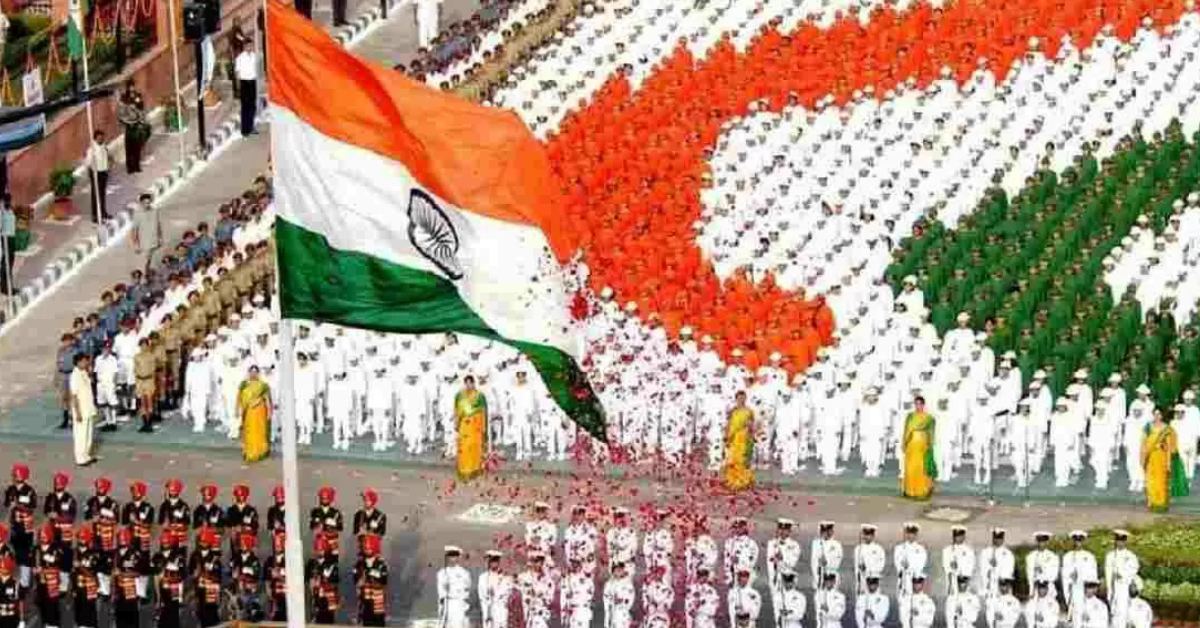
India is now a G20 host, a space power, a global voice on climate action, and a leader in South-South cooperation. But the responsibility Nehru spoke of still applies, to lead not just with power, but with purpose, compassion, and diplomacy in a world struggling with war, displacement, and division.
A call to action and hope
Finally, his speech was a rallying cry. He urged Indians to return to their homes, villages, and workplaces and to dedicate themselves to the task of nation-building. The spirit of optimism and determination rang through his words; the freedom struggle might have ended, but the real work was just beginning.
Every Independence Day is a reminder that citizenship is a duty we perform. Whether it’s voting, volunteering, building inclusive communities, or simply holding truth to power, nation-building is a daily act. The work Nehru spoke of? It’s still ours to do.
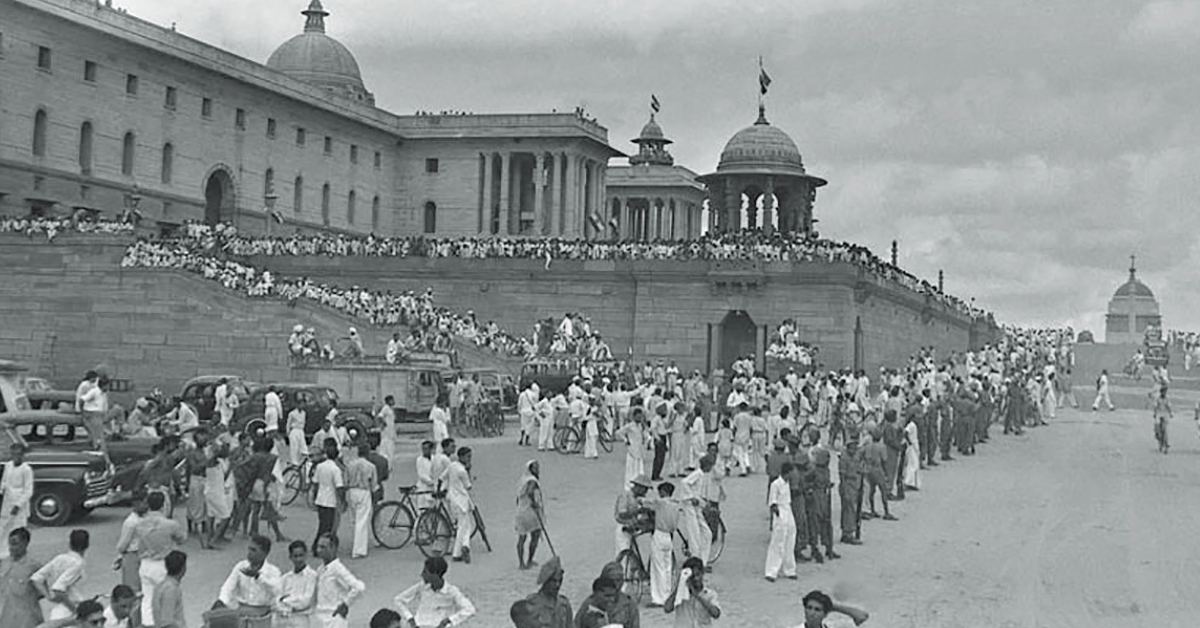
The full version of Jawaharlal Nehru’s midnight speech on 15 August 1947
Below is the complete transcript of Nehru’s historic address, as he stood before the people of India on the very night freedom was achieved:
“Long years ago we made a tryst with destiny, and now the time comes when we shall redeem our pledge, not wholly or in full measure, but very substantially. At the stroke of the midnight hour, when the world sleeps, India will awake to life and freedom. A moment comes, which comes but rarely in history, when we step out from the old to the new, when an age ends, and when the soul of a nation, long suppressed, finds utterance. It is fitting that at this solemn moment, we take the pledge of dedication to the service of India and her people and to the still larger cause of humanity.
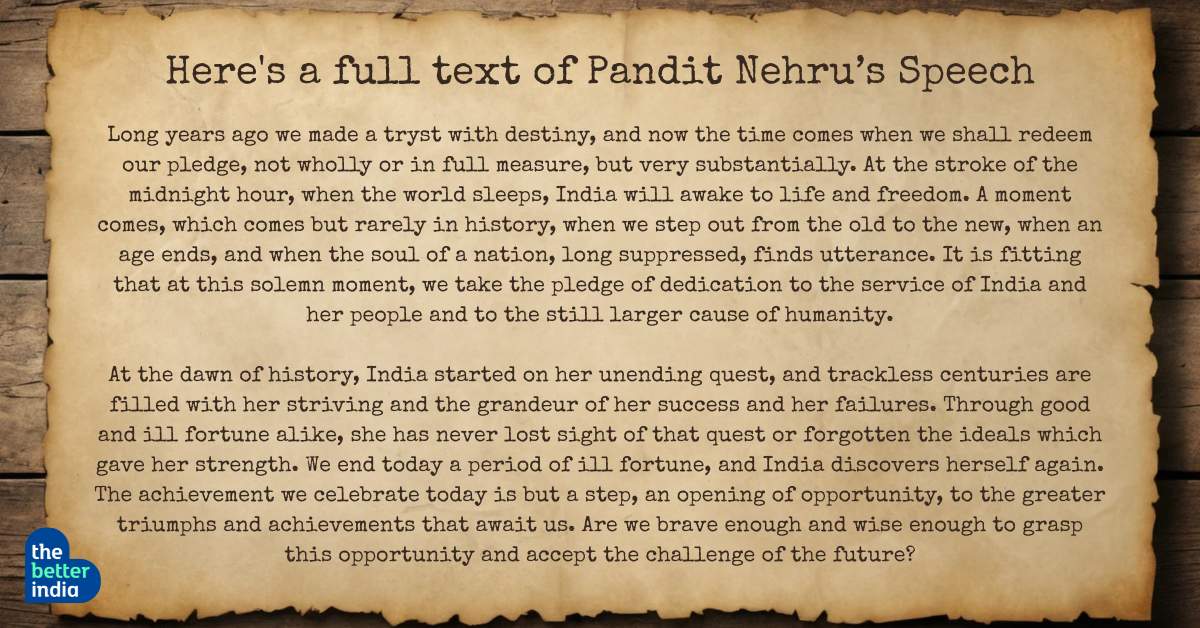
At the dawn of history, India started on her unending quest, and trackless centuries are filled with her striving and the grandeur of her success and her failures. Through good and ill fortune alike, she has never lost sight of that quest or forgotten the ideals which gave her strength. We end today a period of ill fortune, and India discovers herself again. The achievement we celebrate today is but a step, an opening of opportunity, to the greater triumphs and achievements that await us. Are we brave enough and wise enough to grasp this opportunity and accept the challenge of the future?
Freedom and power bring responsibility. The responsibility rests upon this Assembly, a sovereign body representing the sovereign people of India. Before the birth of freedom, we have endured all the pains of labour, and our hearts are heavy with the memory of this sorrow. Some of those pains continue even now. Nevertheless, the past is over, and it is the future that beckons to us now.
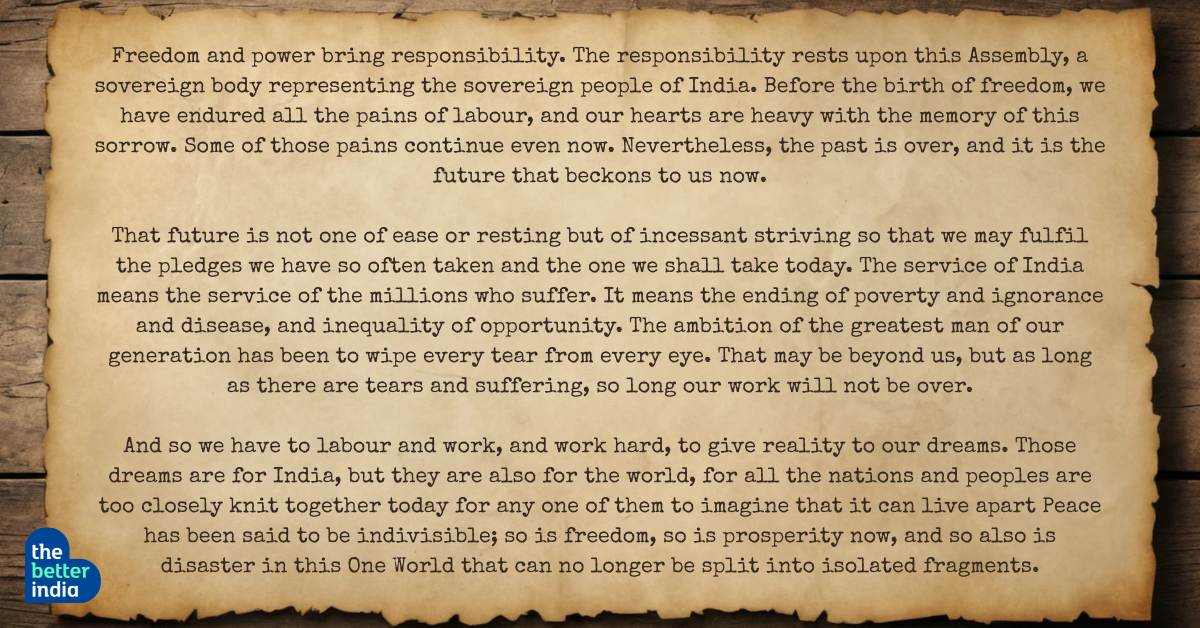
That future is not one of ease or resting but of incessant striving so that we may fulfil the pledges we have so often taken and the one we shall take today. The service of India means the service of the millions who suffer. It means the ending of poverty and ignorance and disease, and inequality of opportunity. The ambition of the greatest man of our generation has been to wipe every tear from every eye. That may be beyond us, but as long as there are tears and suffering, so long our work will not be over.
And so we have to labour and work, and work hard, to give reality to our dreams. Those dreams are for India, but they are also for the world, for all the nations and peoples are too closely knit together today for any one of them to imagine that it can live apart Peace has been said to be indivisible; so is freedom, so is prosperity now, and so also is disaster in this One World that can no longer be split into isolated fragments.
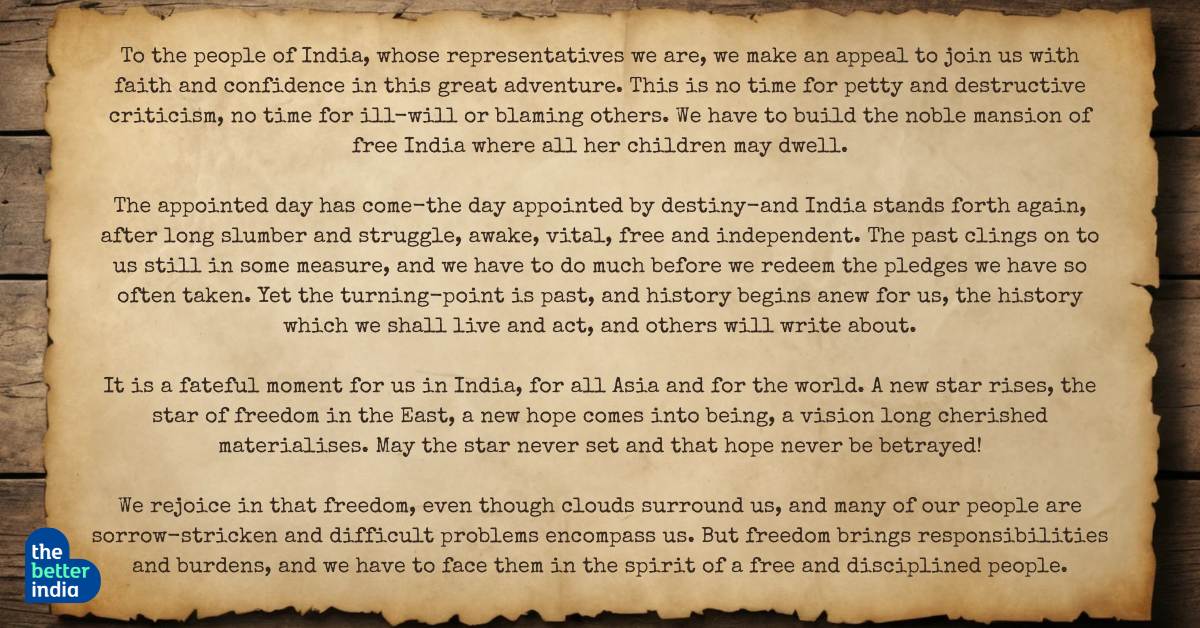
To the people of India, whose representatives we are, we make an appeal to join us with faith and confidence in this great adventure. This is no time for petty and destructive criticism, no time for ill-will or blaming others. We have to build the noble mansion of free India where all her children may dwell.
The appointed day has come-the day appointed by destiny-and India stands forth again, after long slumber and struggle, awake, vital, free and independent. The past clings on to us still in some measure, and we have to do much before we redeem the pledges we have so often taken. Yet the turning-point is past, and history begins anew for us, the history which we shall live and act, and others will write about.
It is a fateful moment for us in India, for all Asia and for the world. A new star rises, the star of freedom in the East, a new hope comes into being, a vision long cherished materialises. May the star never set and that hope never be betrayed!
We rejoice in that freedom, even though clouds surround us, and many of our people are sorrow-stricken and difficult problems encompass us. But freedom brings responsibilities and burdens, and we have to face them in the spirit of a free and disciplined people.
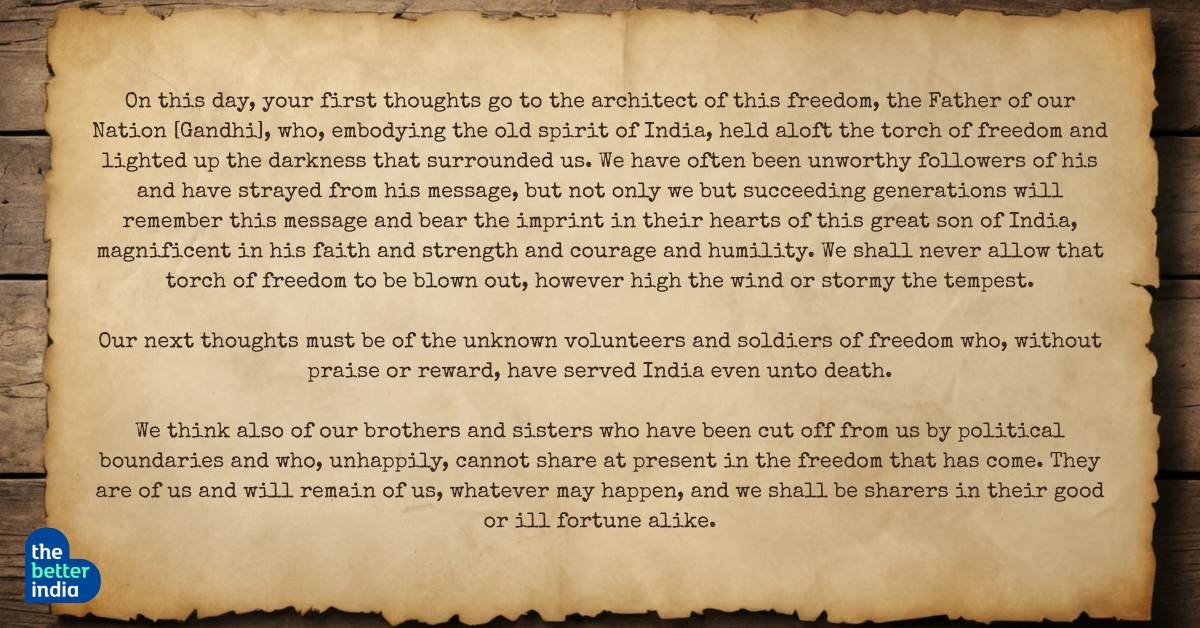
On this day, your first thoughts go to the architect of this freedom, the Father of our Nation (Gandhi), who, embodying the old spirit of India, held aloft the torch of freedom and lighted up the darkness that surrounded us. We have often been unworthy followers of his and have strayed from his message, but not only we but succeeding generations will remember this message and bear the imprint in their hearts of this great son of India, magnificent in his faith and strength and courage and humility. We shall never allow that torch of freedom to be blown out, however high the wind or stormy the tempest.
Our next thoughts must be of the unknown volunteers and soldiers of freedom who, without praise or reward, have served India even unto death.
We think also of our brothers and sisters who have been cut off from us by political boundaries and who, unhappily, cannot share at present in the freedom that has come. They are of us and will remain of us, whatever may happen, and we shall be sharers in their good or ill fortune alike.
The future beckons to us. Whither do we go and what shall be our endeavour? To bring freedom and opportunity to the common man, to the peasants and workers of India; to fight and end poverty and ignorance and disease; to build up a prosperous, democratic and progressive nation, and to create social, economic and political institutions which will ensure justice and fullness of life to every man and woman.
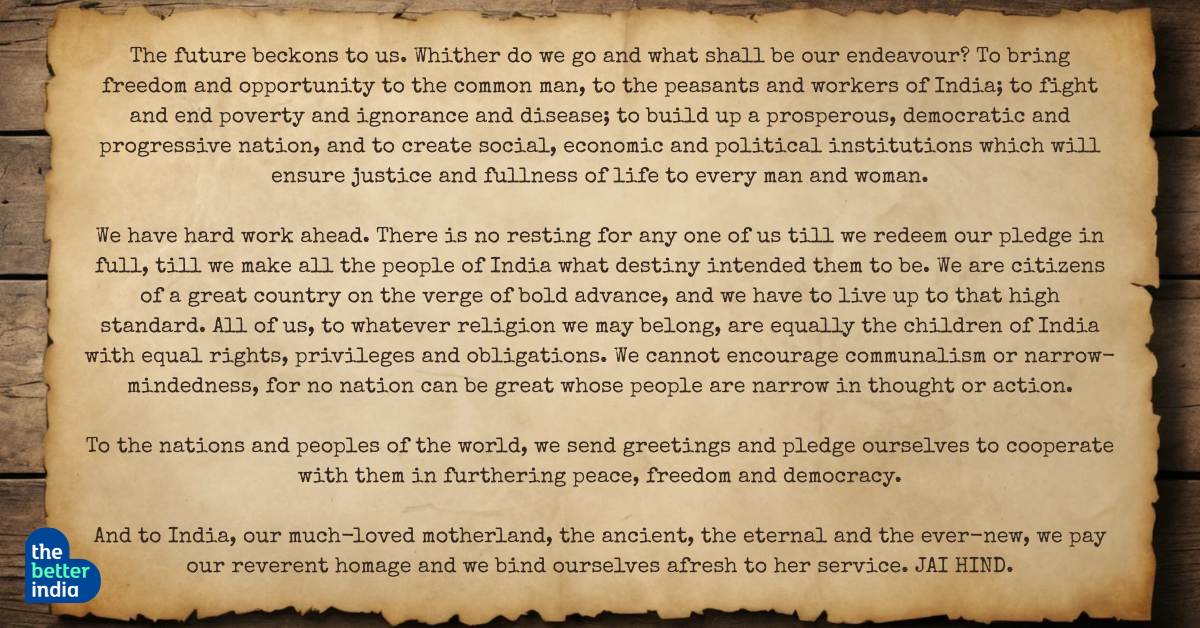
We have hard work ahead. There is no resting for any one of us till we redeem our pledge in full, till we make all the people of India what destiny intended them to be. We are citizens of a great country on the verge of bold advance, and we have to live up to that high standard. All of us, to whatever religion we may belong, are equally the children of India with equal rights, privileges and obligations. We cannot encourage communalism or narrow-mindedness, for no nation can be great whose people are narrow in thought or action.
To the nations and peoples of the world, we send greetings and pledge ourselves to cooperate with them in furthering peace, freedom and democracy.
And to India, our much-loved motherland, the ancient, the eternal and the ever-new, we pay our reverent homage and we bind ourselves afresh to her service.
JAI HIND.
Source:
Internet Modern History Sourcebook, Jawaharlal Nehru (1889-1964): A Tryst with Destiny: Speech on the Granting of Indian Independence, August 14, 1947: Fordham University, 26 Jan 1996
Source Link: thebetterindia.com
Source: thebetterindia.com
Via: thebetterindia.com




















